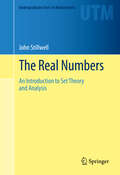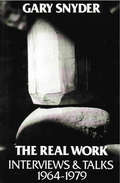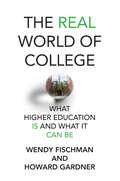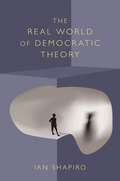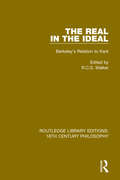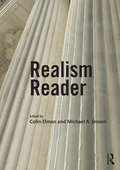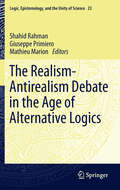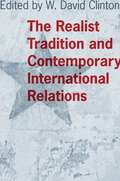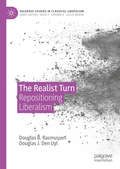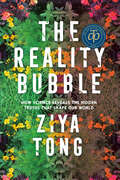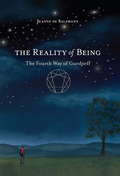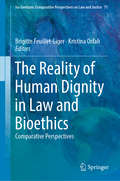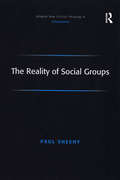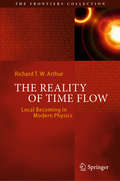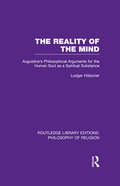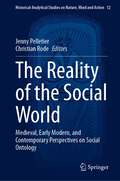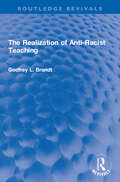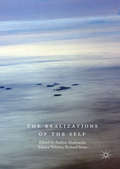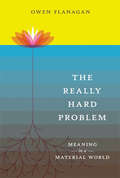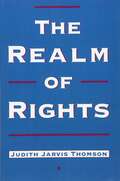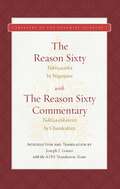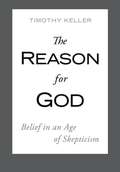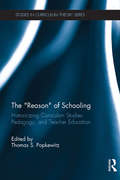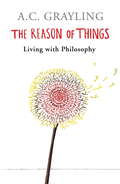- Table View
- List View
The Real Numbers
by John StillwellWhile most texts on real analysis are content to assume the real numbers, or to treat them only briefly, this text makes a serious study of the real number system and the issues it brings to light. Analysis needs the real numbers to model the line, and to support the concepts of continuity and measure. But these seemingly simple requirements lead to deep issues of set theory--uncountability, the axiom of choice, and large cardinals. In fact, virtually all the concepts of infinite set theory are needed for a proper understanding of the real numbers, and hence of analysis itself. By focusing on the set-theoretic aspects of analysis, this text makes the best of two worlds: it combines a down-to-earth introduction to set theory with an exposition of the essence of analysis--the study of infinite processes on the real numbers. It is intended for senior undergraduates, but it will also be attractive to graduate students and professional mathematicians who, until now, have been content to "assume" the real numbers. Its prerequisites are calculus and basic mathematics. Mathematical history is woven into the text, explaining how the concepts of real number and infinity developed to meet the needs of analysis from ancient times to the late twentieth century. This rich presentation of history, along with a background of proofs, examples, exercises, and explanatory remarks, will help motivate the reader. The material covered includes classic topics from both set theory and real analysis courses, such as countable and uncountable sets, countable ordinals, the continuum problem, the Cantor-Schröder-Bernstein theorem, continuous functions, uniform convergence, Zorn's lemma, Borel sets, Baire functions, Lebesgue measure, and Riemann integrable functions.
The Real Work: Interviews and Talks, 1964-79
by Gary Snyder William Scott McleanAmerican poet Gary Snyder on poetics, tribalism, ecology, Zen Buddhism, meditation, the writing process, and more. The Real Work is the second volume of Gary Snyder’s prose to be published by New Directions. Where his earlier Earth House Hold(1969) heralded the tribalism of the "coming revolution," the interviews in The Real Work focus on the living out of that process in a particular place and time––the Sierra Nevada foothills of Northern California in the 1970s. The talks and interviews collected here range over fifteen years (1964-79) and encompass styles as different as those of the Berkeley Barb and The New York Quarterly. A "poetics of process" characterizes these exchanges, but in the words of editor Mclean, their chief attraction is "good, plain talk with a man who has a lively and very subtle mind and a wide range of experience and knowledge."
The Real World of College: What Higher Education Is and What It Can Be
by Howard Gardner Wendy FischmanWhy higher education in the United States has lost its way, and how universities and colleges can focus sharply on their core mission.For The Real World of College, Wendy Fischman and Howard Gardner analyzed in-depth interviews with more than 2,000 students, alumni, faculty, administrators, parents, trustees, and others, which were conducted at ten institutions ranging from highly selective liberal arts colleges to less-selective state schools. What they found challenged characterizations in the media: students are not preoccupied by political correctness, free speech, or even the cost of college. They are most concerned about their GPA and their resumes; they see jobs and earning potential as more important than learning. Many say they face mental health challenges, fear that they don&’t belong, and feel a deep sense of alienation. Given this daily reality for students, has higher education lost its way? Fischman and Gardner contend that US universities and colleges must focus sharply on their core educational mission. Fischman and Gardner, both recognized authorities on education and learning, argue that higher education in the United States has lost sight of its principal reason for existing: not vocational training, not the provision of campus amenities, but to increase what Fischman and Gardner call &“higher education capital&”—to help students think well and broadly, express themselves clearly, explore new areas, and be open to possible transformations. Fischman and Gardner offer cogent recommendations for how every college can become a community of learners who are open to change as thinkers, citizens, and human beings.
The Real World of Democratic Theory
by Ian ShapiroIn this book Ian Shapiro develops and extends arguments that have established him as one of today's leading democratic theorists. Shapiro is hardheaded about the realities of politics and power, and the difficulties of fighting injustice and oppression. Yet he makes a compelling case that democracy's legitimacy depends on pressing it into the service of resisting domination, and that democratic theorists must rise to the occasion of fashioning the necessary tools. That vital agenda motivates the arguments of this book. Tracing modern democracy's roots to John Locke and the American founders, Shapiro shows that they saw more deeply into the dynamics of democratic politics than have many of their successors. Drawing on Lockean and Madisonian insights, Shapiro evaluates democracy's changing global fortunes over the past two decades. He also shows how elusive democracy can be by exploring the contrast between its successful establishment in South Africa and its failures elsewhere--particularly the Middle East. Shapiro spells out the implications of his account for long-standing debates about public opinion, judicial review, abortion, and inherited wealth--as well as more recent preoccupations with globalization, national security, and international terrorism. Scholars, students, and democratic activists will all learn from Shapiro's trenchant account of democracy's foundations, its history, and its contemporary challenges. They will also find his distinctive democratic vision both illuminating and appealing.
The Real in the Ideal: Berkeley's Relation to Kant (Routledge Library Editions: 18th Century Philosophy #13)
by R. C. S. WalkerThis book, first published in 1989, presents sixteen articles on Kant and Berkeley, examining their attitude to the physical world. They were both idealists, regarding the physical world as being in some way a product of perceptions and thought. At the same time they both held it to be no mere illusion, but real and objective: it was in a sense ideal, but in a different sense also real.
The Realism Reader
by Michael Jensen Colin ElmanThe Realism Reader provides broad coverage of a centrally important tradition in the study of foreign policy and international politics. After some years in the doldrums, political realism is again in contention as a leading tradition in the international relations sub-field. Divided into three main sections, the book covers seven different and distinctive approaches within the realist tradition: classical realism, balance of power theory, neorealism, defensive structural realism, offensive structural realism, rise and fall realism, and neoclassical realism. The middle section of the volume covers realism’s engagement with critiques levelled by liberalism, institutionalism, and constructivism and the English School. The final section of the book provides materials on realism’s engagement with some contemporary issues in international politics, with collections on United States (U.S.) hegemony, European cooperation, and whether future threats will arise from non-state actors or the rise of competing great powers. The book offers a logically coherent and manageable framework for organizing the realist canon, and provides exemplary literature in each of the traditions and dialogues which are included in the volume. Offering substantial commentary and analysis and including enhanced pedagogy to facilitate student learning, The Realism Reader will provide a 'one-stop-shop' for undergraduates and masters students taking a course in contemporary international relations theory, with a particular focus on realism.
The Realism-Antirealism Debate in the Age of Alternative Logics
by Shahid Rahman Giuseppe Primiero Mathieu MarionThe relation between logic and knowledge has been at the heart of a lively debate since the 1960s. On the one hand, the epistemic approaches based their formal arguments in the mathematics of Brouwer and intuitionistic logic. Following Michael Dummett, they started to call themselves `antirealists'. Others persisted with the formal background of the Frege-Tarski tradition, where Cantorian set theory is linked via model theory to classical logic. Jaakko Hintikka tried to unify both traditions by means of what is now known as `explicit epistemic logic'. Under this view, epistemic contents are introduced into the object language as operators yielding propositions from propositions, rather than as metalogical constraints on the notion of inference. The Realism-Antirealism debate has thus had three players: classical logicians, intuitionists and explicit epistemic logicians. The editors of the present volume believe that in the age of Alternative Logics, where manifold developments in logic happen at a breathtaking pace, this debate should be revisited. Contributors to this volume happily took on this challenge and responded with new approaches to the debate from both the explicit and the implicit epistemic point of view.
The Realist Tradition and Contemporary International Relations (Political Traditions in Foreign Policy Series)
by W. David ClintonThe tradition in international relations theory known as realism has often been associated with the Cold War. The contributors to this intriguing volume argue, however, that realism remains a profound and relevant perspective on contemporary international politics. They point out that classical realism is based on concepts that were elucidated long before the Cold War began and are not confined by its boundaries. Further, they believe that insights of the realist tradition can provide valuable guidance in our contemporary world.W. David Clinton and ten scholars of foreign policy reexamine the work of thinkers spanning twenty-five centuries who have contributed to the development of realism across the ages. In their essays, the authors consider two key questions: What makes these thinkers "realists"? And how is their work relevant to the modern, post--Cold War world? These essays take a fresh look at such canonical thinkers as Thucydides, Augustine, Machiavelli, Hobbes, Hume, Burke, Carr, Niebuhr, and Morgenthau. Countering the widespread belief that realism has nothing left to offer, this collection demonstrates that continuities remain in the political world -- and that the ideas rooted in realism are too important and too useful to ignore.While there are obvious differences among the political philosophers whose works are considered here, they share a common concern about human limitations and the possible dangerous consequences of ignoring those limitations. Each in his own way, these classic thinkers discuss the need for prudence to counter the ever-present threat of tragedy resulting from our innocent, hopeful, or self-righteous efforts for perfection. These provocative essays demonstrate that though a realist understanding of the nature of international relations is at least as old as Thucydides, it is also as contemporaneous as the most recent headline.
The Realist Turn: Repositioning Liberalism (Palgrave Studies in Classical Liberalism)
by Douglas B. Rasmussen Douglas J. Den UylDouglas B. Rasmussen and Douglas J. Den Uyl maintain that a realist turn—namely, one in which the natural order is the basis for individual rights—is needed to bring about a proper understanding and defense of liberty. They argue that the critical character of individual rights results from their being tethered to metaphysical realism. After reprising their explanation and defense of natural rights, Rasmussen and Den Uyl explain metaphysical realism and defend it against neo-pragmatist objections. They show it to be a formidable and preferable alternative to epistemic constructivism and crucial for a suitable understanding of ideal theory.
The Reality Bubble: Blind Spots, Hidden Truths, and the Dangerous Illusions that Shape Our World
by Ziya TongFrom one of the world's most engaging science journalists, a groundbreaking and wonder-filled look at the hidden things that shape our lives in unexpected and sometimes dangerous ways.Our naked eyes see only a thin sliver of reality. We are blind in comparison to the X-rays that peer through skin, the mass spectrometers that detect the dead inside the living, or the high-tech surveillance systems that see with artificial intelligence.And we are blind compared to the animals that can see in infrared, or ultraviolet, or in 360-degree vision. These animals live in the same world we do, but they see something quite different when they look around.With all of the curiosity and flair that drives her broadcasting, Ziya Tong illuminates this hidden world, and takes us on a journey to examine ten of humanity's biggest blind spots.First, we are introduced to the blind spots we are all born with, to see how technology reveals an astonishing world that exists beyond our human senses. It is with these new ways of seeing that today's scientists can image everything from an atom to a black hole. In Section Two, our collective blind spots are exposed. It's not that we can't see, Tong reminds us. It's that we don't. In the 21st century, there are cameras everywhere, except where our food comes from, where our energy comes from, and where our waste goes. Being in the dark when it comes to how we survive makes it impossible to navigate our future.Lastly, the scope widens to our civilizational blind spots. Here, the blurred lens of history reveals how we inherit ways of thinking about the world that seem natural or inevitable but are in fact little more than traditions, ways of seeing the world that have come to harm it. This vitally important new book shows how science, and the curiosity that drives it, can help civilization flourish by opening our eyes to the landscape laid out before us. Fast-paced, utterly fascinating, and deeply humane, The Reality Bubble gives voice to the sense we've all had -- that there is more to the world than meets the eye.
The Reality of Being: The Fourth Way of Gurdjieff
by Jeanne De SalzmannAs the closest pupil of the charismatic spiritual master G. I. Gurdjieff (1866-1949), Jeanne de Salzmann was charged with carrying on his teachings of spiritual transformation. Known as the Fourth Way or "the Work," Gurdjieff's system was based on teachings of the East that he adapted for modern life in the West. Now, some twenty years after de Salzmann's death, the notebooks that she filled with her insights over a forty-year period (and intended to publish) have been translated and edited by a small group of her family and followers. The result is this long-awaited guide to Gurdjieff's teaching, describing the routes to be traveled and the landmarks encountered along the way. Organized according to themes, the chapters touch on all the important concepts and practices of the Work, including:awakening from the sleep of identification with the ordinary level of beingself-observation and self-rememberingconscious effort and voluntary sufferingunderstanding symbolic concepts like the Enneagramthe Gurdjieff Movements, bodily exercises that provide training in Presence and the awareness of subtle energiesthe necessity of a "school," meaning the collective practice of the teaching in a groupMadame de Salzmann brings to the Work her own strong, direct language and personal journey in learning to live that knowledge of a higher level of being, which, she insists, "you have to see for yourself" on a level beyond theory and concept. De Salzmann consistently refused to discuss the teaching in terms of ideas, for this Fourth Way is to be experienced, not simply thought or believed.
The Reality of Human Dignity in Law and Bioethics: Comparative Perspectives (Ius Gentium: Comparative Perspectives on Law and Justice #71)
by Brigitte Feuillet-Liger Kristina OrfaliAdopting an interdisciplinary perspective, this volume explores the reality of the principle of human dignity – a core value which is increasingly invoked in our societies and legal systems. This book provides a systematic overview of the legal and philosophical concept in sixteen countries representing different cultural and religious contexts and examines in particular its use in a developing case law (including of the European Court of Human Rights and of the Inter-American Court of Human Rights). Whilst omnipresent in the context of bioethics, this book reveals its wider use in healthcare more generally, treatment of prisoners, education, employment, and matters of life and death in many countries. In this unique comparative work, contributing authors share a multidisciplinary analysis of the use (and potential misuse) of the principle of dignity in Europe, Africa, South and North America and Asia. By revealing the ambivalence of human dignity in a wide range of cultures and contexts and through the evolving reality of case law, this book is a valuable resource for students, scholars and professionals working in bioethics, medicine, social sciences and law. Ultimately, it will make all those who invoke the principle of human dignity more aware of its multi-layered character and force us all to reflect on its ability to further social justice within our societies.
The Reality of Social Groups
by Paul SheehyExamining the ontological nature of social groups and the way in which groups should be regarded within moral deliberation this book makes an original contribution to the field of social philosophy. It tackles the fundamental metaphysical question that has either been ignored or unsatisfactorily addressed: ’what kind of thing is a social group?’ Sheehy argues for an ontological realism about groups, defending the thesis that groups are composite material particulars, ontologically on a par with individuals and capable of figuring in their own right in descriptions and explanations. He then goes on to discuss the practical and moral question of whether groups can be regarded as the bearers of moral status, rights and moral judgements.
The Reality of Time Flow: Local Becoming in Modern Physics (The Frontiers Collection)
by Richard T. ArthurIt is commonly held that there is no place for the 'now’ in physics, and also that the passing of time is something subjective, having to do with the way reality is experienced but not with the way reality is. Indeed, the majority of modern theoretical physicists and philosophers of physics contend that the passing of time is incompatible with modern physical theory, and excluded in a fundamental description of physical reality. This book provides a forceful rebuttal of such claims. In successive chapters the author explains the historical precedents of the modern opposition to time flow, giving careful expositions of matters relevant to becoming in classical physics, the special and general theories of relativity, and quantum theory, without presupposing prior expertise in these subjects. Analysing the arguments of thinkers ranging from Aristotle, Russell, and Bergson to the proponents of quantum gravity, he contends that the passage of time, understood as a local becoming of events out of those in their past at varying rates, is not only compatible with the theories of modern physics, but implicit in them.
The Reality of the Mind: St Augustine's Philosophical Arguments for the Human Soul as a Spiritual Substance (Routledge Library Editions: Philosophy of Religion)
by Ludger HölscherAmong the various approaches to the question of the nature of the mind (or soul), Augustine’s philosophical arguments for the existence of an incorporeal and spiritual substance in man and against materialism are here thoroughly examined on their merits as a source of insight for contemporary discussion. This book, originally published in 1986, employs Augustine’s method of introspection, and argues that, as a philosopher, Augustine can teach the modern mind how to detect the reality of such a spiritual subject in and through basic human acts and faculties, such as imagination, memory, knowledge, free-will and self-knowledge. It presents a critical dialogue with various materialistic anthropologies directly addressed by Augustine himself, or those which have arisen at later periods, including epiphenomenalism, mind-brain identity theory, Marxism and others.
The Reality of the Social World: Medieval, Early Modern, and Contemporary Perspectives on Social Ontology (Historical-Analytical Studies on Nature, Mind and Action #12)
by Jenny Pelletier Christian RodeThis book offers a collection of contributions on medieval, early modern, and contemporary perspectives on social ontology. Since the 1990s, social ontology has emerged as a vibrant research area in contemporary analytical philosophy. Questions concerning the nature and properties of social groups, institutions, facts, and objects like money and marriage, have been thoroughly discussed. However, the historical perspective has been largely neglected. One of the central aims of this volume is to show that relevant views on social ontology can be found in medieval and early modern philosophy (ca. 1200-1700 C.E.), when, for example, the ontological status of money, law, and the sacraments was hotly debated. We see, furthermore, diverging positions between Aristotelian-inspired authors, who resort to a more naturalistic view of the emergence of the social realm, and authors like Olivi and Ockham, who emphasize the role of human free will and contractualist agreements. This book is the very first to address historical and contemporary social ontologies. Both historians of philosophy and philosophers will benefit from this juxtaposition, which fosters a better understanding of historical positions and approaches by using today’s conceptual and analytical tools, and allows the contemporary debate to gain new perspectives by confronting its own medieval and early modern history.
The Realization of Anti-Racist Teaching (Routledge Revivals)
by Godfrey L. BrandtFirst published in 1986, The Realization of Anti-Racist Teaching explores the subject and importance of anti-racist education. The book examines the relationship between the educational debate at the level of academic institutions, professional organisations, and local education authorities within the context of the actual practice of teaching. It also questions how to link anti-racist theories put forward by theorists and activists to the practice of teachers. The Realization of Anti-Racist Teaching is a detailed discussion of the history of racism and of anti-racist teaching and education.
The Realizations of the Self
by Richard Stone Andrea Altobrando Takuya NiikawaRecent discussions of self-realization have devolved into unscientific theories of self-help. However, this vague and often misused concept is connected to many important individual and social problems. As long as its meaning remains unclear, it can be abused for social, political, and commercial malpractices. To combat this issue, this book shares perspectives from scholars of various philosophical traditions. Each chapter takes new steps in asking what the meaning of self-realization is–both in terms of what it means to understand who or what one is, and also in terms of how one can, or should, fulfilll oneself. The conceptual elucidations achieved from both theoretical and practical perspectives allow for a more mature awareness of how to deal with discourses on self-realization and, in any case, can help to demystify the subject.
The Really Hard Problem
by Owen FlanaganHonorable Mention, Philosophy category, 2007 Professional/Scholarly Publishing Awards for Excellence Competition presented by the Association of American Publishers, Inc. If consciousness is the "hard problem" in mind science--explaining how the amazing private world of consciousness emerges from neuronal activity--then the "really hard problem," writes Owen Flanagan in this provocative book is explaining how meaning is possible in the material world. How can we make sense of the magic and mystery of life naturalistically, without an appeal to the supernatural? How do we say truthful and enchanting things about being human if we accept the fact that we are finite material beings living in a material world, or, in Flanagan's description, short-lived pieces of organized cells and tissue? Flanagan's answer is both naturalistic and enchanting. We all wish to live in a meaningful way, to live a life that really matters, to flourish, to achieve eudaimonia--to be a "happy spirit." Flanagan calls his "empirical-normative" inquiry into the nature, causes, and conditions of human flourishing eudaimonics.Eudaimonics,systematic philosophical investigation that is continuous with science, is the naturalist's response to those who say that science has robbed the world of the meaning that fantastical, wishful stories once provided. Flanagan draws on philosophy, neuroscience, evolutionary biology, and psychology, as well as on transformative mindfulness and self-cultivation practices that come from such nontheistic spiritual traditions as Buddhism, Confucianism, Aristotelianism, and Stoicism, in his quest. He gathers from these disciplines knowledge that will help us understand the nature, causes, and constituents of well-being and advance human flourishing. Eudaimonicscan help us find out how to make a difference, how to contribute to the accumulation of good effects--how to live a meaningful life.
The Really Hard Problem: Meaning in a Material World (Bradford Bks.)
by Owen FlanaganA noted philosopher proposes a naturalistic (rather than supernaturalistic) way to solve the "really hard problem": how to live in a meaningful way—how to live a life that really matters—even as a finite material being living in a material world. If consciousness is "the hard problem" in mind science—explaining how the amazing private world of consciousness emerges from neuronal activity—then "the really hard problem," writes Owen Flanagan in this provocative book, is explaining how meaning is possible in the material world. How can we make sense of the magic and mystery of life naturalistically, without an appeal to the supernatural? How do we say truthful and enchanting things about being human if we accept the fact that we are finite material beings living in a material world, or, in Flanagan's description, short-lived pieces of organized cells and tissue?Flanagan's answer is both naturalistic and enchanting. We all wish to live in a meaningful way, to live a life that really matters, to flourish, to achieve eudaimonia—to be a "happy spirit." Flanagan calls his "empirical-normative" inquiry into the nature, causes, and conditions of human flourishing eudaimonics. Eudaimonics, systematic philosophical investigation that is continuous with science, is the naturalist's response to those who say that science has robbed the world of the meaning that fantastical, wishful stories once provided.Flanagan draws on philosophy, neuroscience, evolutionary biology, and psychology, as well as on transformative mindfulness and self-cultivation practices that come from such nontheistic spiritual traditions as Buddhism, Confucianism, Aristotelianism, and Stoicism, in his quest. He gathers from these disciplines knowledge that will help us understand the nature, causes, and constituents of well-being and advance human flourishing. Eudaimonics can help us find out how to make a difference, how to contribute to the accumulation of good effects—how to live a meaningful life.
The Realm of Rights
by Judith Jarvis ThomsonThe concept of a right is fundamental to moral, political, and legal thinking, but much of the use of that concept is selective and fragmentary: it is common merely to appeal to this or that intuitively plausible attribution of rights as needed for purposes of argument. In The Realm of Rights Judith Thomson provides a full-scale, systematic theory of human and social rights, bringing out what in general makes an attribution of a right true. <p><p> Thomson says that the question what it is to have a right precedes the question which rights we have, and she therefore begins by asking why our having rights is a morally significant fact about us. She argues that a person’s having a right is reducible to a complex moral constraint: central to that constraint is that, other things being equal, the right ought to be accorded. Thomson asks what those other things are that may or may not be equal, and describes the tradeoffs that relieve us of the requirement to accord a right. <p><p> Our rights fall into two classes, those we have by virtue of being human beings and those we have by virtue of private interactions and law. Thomson argues that the first class includes rights that others not kill or harm us, but does not include rights that others meet our needs. The second class includes rights that issue from promises and consent, and Thomson shows how they are generated; she also argues that property rights issue only from a legitimate legal system, so that the second class includes them as well. <p><p> The Realm of Rights will take its place as a major effort to provide a stable foundation for our deeply held belief that we are not mere cogs in a communal machine, but are instead individuals whose private interests are entitled to respect.
The Reason Sixty: Second Edition
by Joseph J. LoizzoPresents two key Indian Buddhist philosophical masterpieces that integrate the Buddhist ethos of wisdom and compassion, with their profound relevance to contemporary thought clarified by a renowned scholar of contemplative science.This volume contains English translations of two critical treatises of the Middle Way (Madhyamaka) Buddhist philosophical school: the Reason Sixty, by the most important of Indian thinkers, Nagarjuna (2nd CE), and the commentary by his most influential successor, Chandrakirti (7th CE). These two treatises emphasize the non-foundationalist reasoning for which Madhyamaka thought is famed, here within the context of that quintessential Buddhist topic, universal compassion, thereby illuminating the nondual nature of these two fundamental components of Indian Buddhist thought. The full import of Nagarjuna&’s verses are brought to life by Chandrakirti, whose influence in Tibetan Buddhist educational institutions remains profound to the present. Translator Joseph Loizzo, a Harvard-trained psychiatrist and Columbia-trained Buddhologist, elucidates the relevance of these two treatises to the linguistic turn in contemporary philosophy and emphasizes their practical, therapeutic possibilities. Comparing, in particular, the deep resonances between Chandrakirti&’s commentary and Wittgenstein&’s later work, Loizzo presents a masterful analysis in cross-cultural thought that highlights the transformative potential of philosophy.
The Reason for God: Belief in an Age of Skepticism
by Timothy KellerKeller explains how faith in a Christian God is a soundly rational belief, held by thoughtful people of intellectual integrity with a deep compassion for those who truly want to know the truth.
The Reason of Schooling: Historicizing Curriculum Studies, Pedagogy, and Teacher Education (Studies in Curriculum Theory Series)
by Thomas S. PopkewitzProblematizing the "reason" of schooling as historical and political, in this book leading international and interdisciplinary scholars challenge the common sense of schooling and the relation of society, education, and curriculum studies. Examining the limits of contemporary notions of power and schooling, the argument is that the principles that order school subjects, the curriculum, and teaching reforms are historical practices that govern what is thought, acted on, and talked about. Highlighting the dynamics of social exclusion, the normalizing of people through curriculum, and questions of social inclusion, The "Reason" of Schooling underscores the urgency for rethinking curriculum research.
The Reason of Things: Living with Philosophy
by A.C. GraylingThe follow-up to THE MEANING OF THINGS which continues A.C. Grayling's philosophical journey through lifeThe most important question we can ask ourselves is: what kind of life is the best? This is the same as asking: How does one give meaning to one's life? How can one justify one's existence and make it worthwhile?How does one make experience valuable, and keep growing and learning in the process - and through this learning acquire a degree of understanding of oneself and the world? A civilised society is one which never ceases debating with itself about what human life should best be. Some would, with justice, say that if we want ours to be such a society we must all contribute to that discussion.This book is, with appropriate diffidence, such a contribution. It consists of a collection of Grayling's regular 'Last Word' columns in the Guardian. This time topics include Suicide, Deceit, Luxury, Profit, Marriage, Meat-eating, Liberty, Slavery, Protest, Guns and War.
